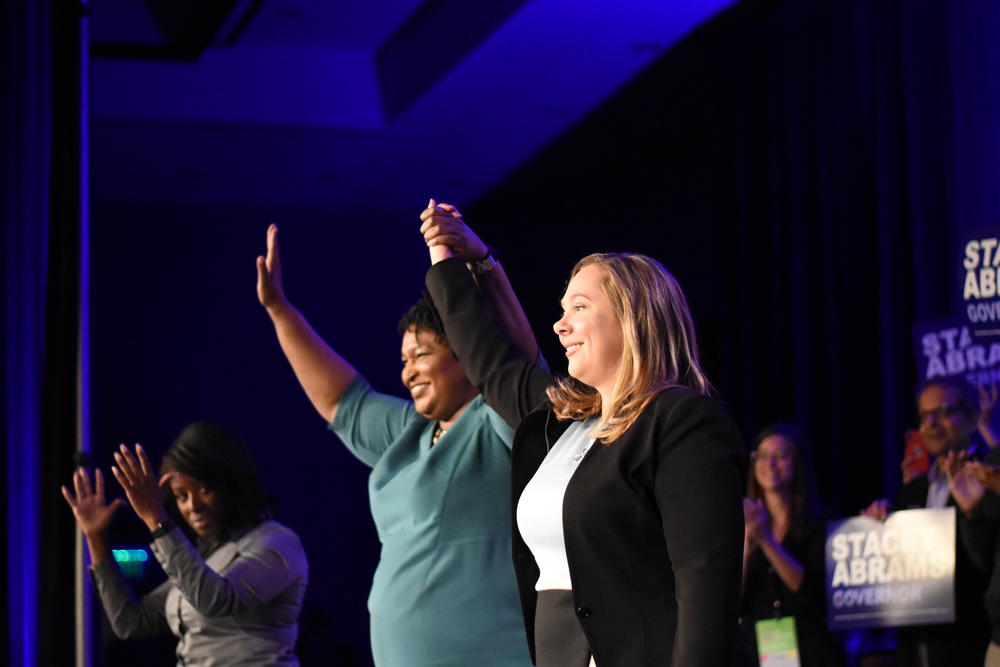Section Branding
Header Content
From ‘Gnat Line To BeltLine,’ Georgia Democrats Largely Focus On Local Message, Not Trump
Primary Content
From the sound of the closing minutes of the Democratic Party of Georgia’s state convention, you’d almost forget that Republicans control the governor’s mansion, both chambers of the state legislature and all 12 statewide elected offices.
In fact, you’d almost forget there were Republicans at all. While some speeches did mention President Donald Trump or specific Republican opponents, many nominees took a subtler approach by touting specific issues they wanted to address – or that the Republican party had not.
The state party says they are putting together their largest-ever campaign to reach voters ahead of November’s election.
Executive Director Rebecca DeHart says part of the strategy is targeting places beyond traditionally Democratic areas – but doubling down in those places, too.
“We are knocking on more doors, we are making more calls, we are sending more texts, we are having more volunteers coming out and putting their blood, sweat and tears into this campaign than we ever have before,” DeHart said.
And their message is not built around opposing Trump.
“What’s happening in the White House doesn’t have a lot to do with what’s happening in every corner of Georgia,” she said. “They’re really looking for a governor who’s going to be able to expand Medicaid or invest in public education do the things only a governor and a lieutenant governor and an insurance commissioner can do.”
DeHart said it is important that the Democrat candidates still talk about Georgia and how they can impact Georgia families.
The state party’s coordinated campaign is helping matters, too. Candidates up and down the ballot have access to more resources, more exposure and more freedom to focus on their key issues.
Sarah Riggs Amico, the nominee for lieutenant governor, said her campaign has been getting a positive response from heavily Republican areas of Georgia.
“I’m traveling in every nook and cranny of the state,” she said. “And, candidly, we’re getting a very good response, because I don’t think most Americans – and certainly most Georgians – line up perfectly with either political party."
Georgia Democrats are targeting more than just Republican areas. Some of the speeches acknowledged the party’s struggle with rural voters.
Agriculture commissioner nominee Fred Swann told the crowd his campaign in particular is attuned to reaching rural voters.
“My office isn’t exclusively rural, but it is uniquely rural,” Swann said. “And let’s be honest… that is where Democrats have been having a hard time."
Gubernatorial nominee Stacey Abrams added on later, calling for the party to reach voters from the “gnat line” in Middle Georgia to the BeltLine in Atlanta.
The largest focus is on the nationally-watched race between Abrams and Secretary of State Brian Kemp. Both of them enjoy sizable fundraising and name recognition (Abrams was the state house minority leader from 2011-2017) and they are crisscrossing the state in earnest to win the state’s top seat.
But for the rest of the statewide nominees, getting the word out is more difficult. Several incumbents have been in office for at least eight years, and only two of Georgia’s U.S. House Representatives have served less than two terms.
Incumbency works: the 2016 election cycle saw House incumbents win re-election 98 percent of the time.
So what is driving Democrats to make them think they can flip seats?
There is that subtle mention of opposition to the president and changing of the guard with how government is run.
Carolyn Bourdeaux, the Democratic nominee for Georgia's 7th congressional district, hit on both topics in a brief interview about her district’s priorities.
“I would say healthcare is really front and center, and there’s also the prescription drug issue,” Bourdeaux said. “I would say something that also crosses across all lines is dealing with corruption.”
Bourdeaux added that representatives in Congress are “completely bought by a lot of special interests.”
But the biggest applause lines from the state convention came not from Trump or opponents or mentioning the Republican party. Instead, it was things like expanding Medicaid, keeping guns out of schools and growing the economy.
And that’s something that starts at the top. After debuting a new ad featuring her parents, Abrams said Democrats need to zero in on talking to people and sharing the party’s message.
Though she has enjoyed much attention through the mediums, Abrams told the crowd that elections aren’t won on Facebook and Twitter.
“We’ve got to accept a little bit of responsibility,” Abrams said. “The thing of it is, they don’t vote because we don’t ask.”


